The Catalyst Killing - [51]
I gave her a sharp look. She lit another cigarette with shaking hands and took a deep drag.
‘That was when I saw him. He was standing there by the corner of a house on one of the side roads, looking at us.’
She said nothing more, and looked at me with an odd mixture of confusion and joy in her eyes.
‘And the man who was standing there was…?’
She nodded gravely. Then she whispered the name I had guessed before she said it, and which made the room spin.
‘Falko.’
I stared hard at Kristine Larsen. Her eyes were wet with tears, but she did not look away for a moment.
‘He was just as tall, just as dark and just as irresistibly handsome as when I last saw him. I would have recognized him anywhere in the world. He stood by the corner of the house for a few moments without moving, then disappeared from sight again between the houses. I don’t know whether he was waiting for Marie or me. And I don’t know if she saw him. But I did. It was my Falko standing there in the road – I am as sure about that as I am that I’m sitting here on this chair.’
At first I did not really know what to say to this highly unexpected turn of events. So I kept quiet for a few seconds. Behind me, I heard the clock on the wall strike eleven. And then I heard myself say to Kristine Larsen that she was under arrest and would be held on remand, on suspicion of murdering Marie Morgenstierne.
XII
It was by now half past eleven. I sat on my own in my office and thought about the situation.
Kristine Larsen had accepted being taken into custody with unexpected dignity, saying that at least in prison she no longer need fear the faceless murderer as she had every second since the news of Marie Morgenstierne’s death. But she continued to maintain that she was innocent, and that the murderer was still out there somewhere.
She begged me in earnest to continue with the investigation. And with even more urgency, she asked that Falko Reinhardt be informed of where she was, if he was found. She had to see him as soon as he turned up. He would no doubt then be able to corroborate her version of what had happened the evening that Marie Morgenstierne died.
At twenty-five past eleven, I rang Patricia. She picked up the telephone on the second ring. It sounded as though she was stifling a yawn, but she soon perked up when I started by saying: ‘Following some dramatic developments this evening I have now arrested the person I believe to be Marie Morgenstierne’s murderer!’
I waited for some sign of delight, but it never came.
‘Gracious, do tell!’ Patricia said, instead.
Then she listened silently to my brief account of my meeting with Kristine Larsen and her ensuing statement.
‘Very interesting indeed. But who have you arrested as a result?’ she asked, when I had finished.
‘Kristine Larsen, of course,’ I replied.
There was not a sound to be heard on the line for a moment or two. Not a sound.
‘Oh, for goodness’ sake, what have you done now?’ Patricia exclaimed in disbelief.
Something, I realized, was terribly wrong. But the indications that Kristine Larsen was guilty were so clear to me that I was not going to give up without a fight.
‘The case is of course not solved yet, in terms of all the details. But even so, you cannot deny that Kristine Larsen had both the motive and the opportunity to shoot Marie Morgenstierne.’
This gave about two seconds’ respite. Then Patricia’s voice slammed back into my ear like the recoil from a gun.
‘Absolutely. Kristine Larsen could have shot Marie Morgenstierne. But why on earth would the sight of Kristine Larsen have caused Marie Morgenstierne suddenly to panic and run for her life? Have you thought about that?’
I had not given that side of the matter any thought at all. And now that I was forced to think about it, I found no good answer.
The memory of the terrified Marie Morgenstierne hammering on the train doors in desperation popped up in my mind. Kristine Larsen’s harmless appearance could not possibly have made Marie Morgenstierne run for her life. Particularly not when she had in fact left the meeting with Kristine Larsen, had turned down the offer of a lift, and then walked slowly and calmly towards the station.
Either something inexplicable had happened in the meantime that alerted Marie Morgenstierne to the fact that Kristine Larsen was now going to shoot her – or it was, quite simply, not Kristine Larsen from whom Marie Morgenstierne was fleeing.
The floor was heaving beneath my feet when I asked Patricia if she had any plans for Sunday. She replied that she had no plans that could not be changed, and that I was very welcome to come for lunch around midday if that suited. Then she added that I should bring with me any fingerprints that had been found, and anything else of interest that I might discover in the meantime.
I promised to do so. Then I put down the receiver and sank back into my chair.
Kristine Larsen remained on remand. There were still reasonable grounds to suspect her, but it was with a heavy heart that I went out into the dark just before midnight.
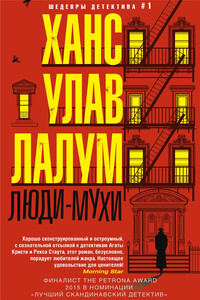
Убит бывший лидер норвежского Сопротивления и бывший член кабинета министров Харальд Олесен. Его тело обнаружено в запертой квартире, следов взлома нет, орудие убийства отсутствует. На звук выстрела к двери Олесена сбежались все соседи, но никого не увидели. Инспектор уголовного розыска Колбьёрн Кристиансен считает, что убийство, скорее всего, совершил кто-то из них. Более того, он полагает, что их показания лживы.
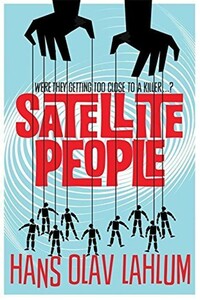
A gripping, evocative, and ingenious mystery which pays homage to Agatha Christie, Satellite People is the second Norwegian mystery in Hans Olav Lahlum's series. Oslo, 1969: When a wealthy man collapses and dies during a dinner party, Norwegian Police Inspector Kolbjorn Kristiansen, known as K2, is left shaken. For the victim, Magdalon Schelderup, a multimillionaire businessman and former resistance fighter, had contacted him only the day before, fearing for his life. It soon becomes clear that every one of Schelderup's 10 dinner guests is a suspect in the case.
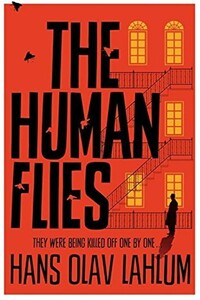
Oslo, 1968: ambitious young detective Inspector Kolbjorn Kristiansen is called to an apartment block, where a man has been found murdered. The victim, Harald Olesen, was a legendary hero of the Resistance during the Nazi occupation, and at first it is difficult to imagine who could have wanted him dead. But as Detective Inspector Kolbjorn Kristiansen (known as K2) begins to investigate, it seems clear that the murderer could only be one of Olesen's fellow tenants in the building. Soon, with the help of Patricia – a brilliant young woman confined to a wheelchair following a terrible accident – K2 will begin to untangle the web of lies surrounding Olesen's neighbors; each of whom, it seems, had their own reasons for wanting Olesen dead.
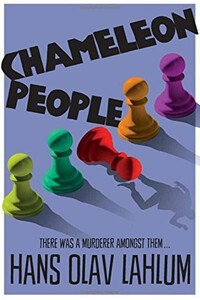
From the international bestselling author, Hans Olav Lahlum, comes Chameleon People, the fourth murder mystery in the K2 and Patricia series.1972. On a cold March morning the weekend peace is broken when a frantic young cyclist rings on Inspector Kolbjorn 'K2' Kristiansen's doorbell, desperate to speak to the detective.Compelled to help, K2 lets the boy inside, only to discover that he is being pursued by K2's colleagues in the Oslo police. A bloody knife is quickly found in the young man's pocket: a knife that matches the stab wounds of a politician murdered just a few streets away.The evidence seems clear-cut, and the arrest couldn't be easier.
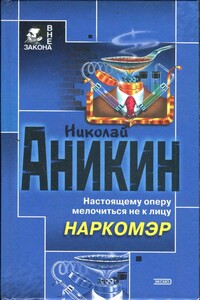
Тупик. Стена. Старый кирпич, обрывки паутины. А присмотреться — вроде следы вокруг. Может, отхожее место здесь, в глухом углу? Так нет, все чисто. Кто же сюда наведывается и зачем? И что охраняет тут охрана? Да вот эту стену и охраняет. Она, как выяснилось, с секретом: время от времени отъезжает в сторону. За ней цех. А в цеху производят под видом лекарства дурь. Полковник Кожемякин все это выведал. Но надо проникнуть внутрь и схватить за руку отравителей, наживающихся на здоровье собственного народа. А это будет потруднее…

«Посмотреть в послезавтра» – остросюжетный роман-триллер Надежды Молчадской, главная изюминка которого – атмосфера таинственности и нарастающая интрига.Девушка по имени Венера впадает в кому при загадочных обстоятельствах. Спецслужбы переправляют ее из закрытого городка Нигдельск в Москву в спецклинику, где известный ученый пытается понять, что явилось причиной ее состояния. Его исследования приводят к неожиданным результатам: он обнаруживает, что их связывает тайна из его прошлого.
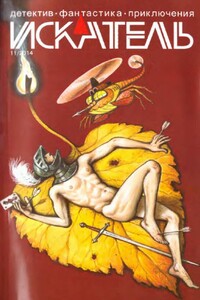
«ИСКАТЕЛЬ» — советский и российский литературный альманах. Издаётся с 1961 года. Публикует фантастические, приключенческие, детективные, военно-патриотические произведения, научно-популярные очерки и статьи. В 1961–1996 годах — литературное приложение к журналу «Вокруг света», с 1996 года — независимое издание.В 1961–1996 годах выходил шесть раз в год, в 1997–2002 годах — ежемесячно; с 2003 года выходит непериодически.Содержание:Анатолий Королев ПОЛИЦЕЙСКИЙ (повесть)Олег Быстров УКРАДИ МОЮ ЖИЗНЬ (окончание) (повесть)Владимир Лебедев ГОСТИ ИЗ НИОТКУДА.
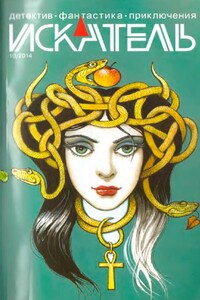
«ИСКАТЕЛЬ» — советский и российский литературный альманах. Издается с 1961 года. Публикует фантастические, приключенческие, детективные, военно-патриотические произведения, научно-популярные очерки и статьи. В 1961–1996 годах — литературное приложение к журналу «Вокруг света», с 1996 года — независимое издание.В 1961–1996 годах выходил шесть раз в год, в 1997–2002 годах — ежемесячно; с 2003 года выходит непериодически.Содержание:Олег Быстров УКРАДИ МОЮ ЖИЗНЬ (повесть);Петр Любестовский КЛЕТКА ДЛЯ НУТРИИ (повесть)
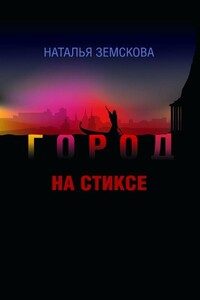
Наталья Земскова — журналист, театральный критик. В 2010 г. в издательстве «Астрель» (Санкт-Петербург) вышел её роман «Детородный возраст», который выдержал несколько переизданий. Остросюжетный роман «Город на Стиксе» — вторая книга писательницы. Молодая героиня, мечтает выйти замуж и уехать из забитого новостройками областного центра. Но вот у неё на глазах оживают тайны и легенды большого губернского города в центре России, судьбы талантливых людей, живущих рядом с нею. Роман «Город на Стиксе» — о выборе художника — провинция или столица? О том, чем рано или поздно приходится расплачиваться современному человеку, не верящему ни в Бога, ни в черта, а только в свой дар — за каждый неверный шаг.
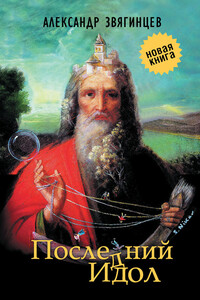
В сборник «Последний идол» вошли произведения Александра Звягинцева разных лет и разных жанров. Они объединены общей темой исторической памяти и личной ответственности человека в схватке со злом, которое порой предстает в самых неожиданных обличиях. Публикуются рассказы из циклов о делах следователей Багринцева и Северина, прокуроров Ольгина и Шип — уже известных читателям по сборнику Звягинцева «Кто-то из вас должен умереть!» (2012). Впервые увидит свет пьеса «Последний идол», а также цикл очерков писателя о событиях вокруг значительных фигур общественной и политической жизни России XIX–XX веков — от Петра Столыпина до Солженицына, от Александра Керенского до Льва Шейнина.